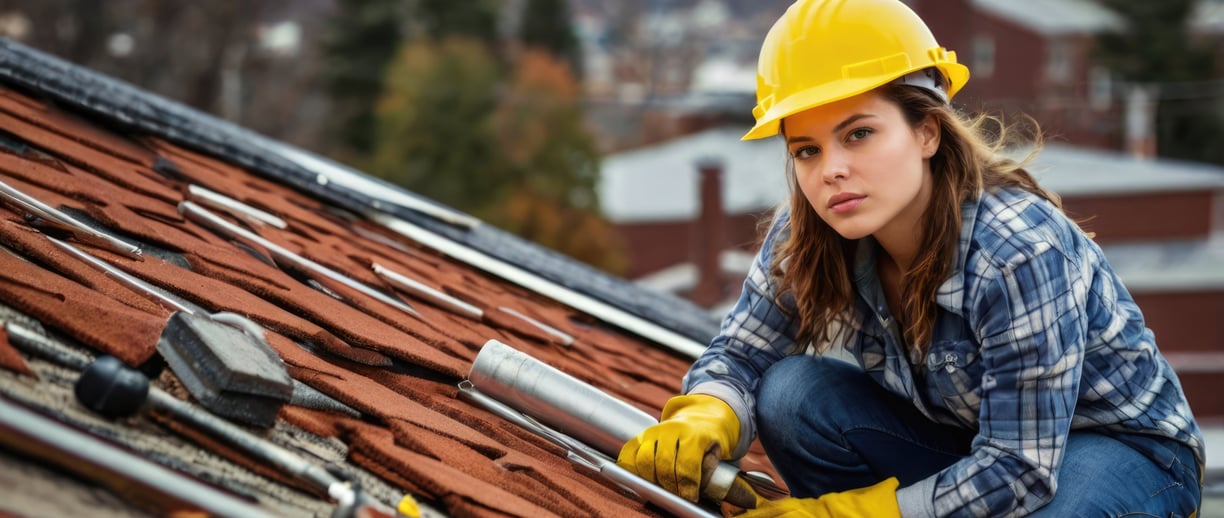Understanding Roofing Costs: What Factors Affect Your Roof Installation Budget
"Learn what factors impact your roof installation budget from experienced roofing contractors. This guide explains how material choices, roof complexity, labor quality, and regional factors affect pricing. Understand the difference between timberline shingles, metal roofing, and other options while learning to recognize value beyond the bottom-line price when comparing estimates from roofing companies near me."
3/18/20254 min read


Understanding Roofing Costs: What Factors Affect Your Roof Installation Budget
When planning for a new roof, homeowners in Illinois often wonder why estimates from different roofing companies vary so significantly. As experienced roofing contractors serving Illinois, we believe in transparency when it comes to pricing. This guide explains the key factors that influence your roof installation budget, helping you make informed decisions and recognize the value behind the numbers.
Material Costs: Quality and Type Matter
The roofing materials you select significantly impact your overall budget:
Asphalt Shingles
Standard Three-Tab Shingles: The most economical option
Architectural Shingles: Mid-range pricing with improved aesthetics and durability
Premium Timberline Shingles: Higher cost with enhanced appearance and longevity
When comparing estimates from roofing companies near me, note that premium materials from manufacturers like Atlas Roofing typically cost more upfront but offer better long-term value through extended warranties and durability.
Metal Roofing
Metal roofing systems present a higher initial investment but deliver exceptional longevity:
Standing Seam Panels: Higher-end option with concealed fasteners
Metal Shingles: Mid-range pricing with traditional appearance
Corrugated Panels: More economical but with exposed fasteners
The thickness (gauge) of metal and finish quality also affect pricing. Quality metal roofing materials from specialized roofing supply vendors typically cost 2-3 times more than standard asphalt shingles but can last 2-3 times longer.
Other Premium Materials
Other roofing options available from roofing contractors include:
Concrete or Clay Tiles: Higher cost with classic Illinois aesthetic
Synthetic Roofing Products: Mid to high range with excellent durability
Flat Roofing Membranes: Pricing varies based on specific system
Underlayment and Components
Beyond the visible roofing materials, your budget should account for:
Roofing Felt Paper: Standard 15# or premium 30# options
Synthetic Roofing Underlayment: Higher cost but superior protection
Ice and Water Shield: Critical in vulnerable areas
Flashing Materials: Aluminum, copper, or galvanized steel options
Professional roofing contractors will recommend appropriate underlayment based on your primary roofing material and local climate conditions.
Roof Complexity and Size
The physical characteristics of your roof significantly impact installation costs:
Square Footage
Roofing is typically priced per "square" (100 square feet):
Average 2,000 sq. ft. Single-Story Home: Approximately 20-24 roofing squares
Larger Two-Story Home: Can range from 25-40 squares or more
When getting estimates from roofing companies near me, ensure they accurately measure your roof rather than simply using your home's floor plan dimensions.
Pitch and Steepness
Steeper roofs require:
Additional safety equipment
Slower installation process
More labor hours
Specialized techniques
A roof with a steep pitch (8/12 or greater) can increase labor costs by 25-50% compared to a moderately pitched roof.
Complexity Factors
Features that increase complexity and cost include:
Multiple levels and transitions
Numerous valleys and dormers
Skylights and chimneys
Unique architectural details
Challenging access points
Each penetration, valley, or transition requires additional materials and labor for proper waterproofing.
Labor and Installation Quality
The expertise of your roofing contractors directly impacts both cost and quality:
Standard vs. Premium Installation
Different installation approaches include:
Basic Installation: Meets minimum requirements
Enhanced Installation: Additional fasteners and sealants
Premium Installation: Comprehensive system with upgraded components
Premium installations often include enhanced techniques like six-nail patterns for shingles rather than the standard four-nail approach, providing superior wind resistance.
Crew Experience
The experience level of the installation team affects:
Installation speed and efficiency
Attention to critical details
Proper handling of roofing supplies
Long-term roof performance
Professional roofing companies invest in ongoing training for their teams, which may be reflected in their pricing.
Warranty Coverage
Labor warranty options typically include:
1-5 Year: Basic coverage
10 Year: Enhanced protection
Lifetime: Premium service commitment
Extended labor warranties provide valuable protection but add to your initial investment.
Existing Roof Considerations
The condition of your current roof influences installation costs:
Tear-Off Requirements
Options and considerations include:
Complete Removal: Necessary for damaged decking or multiple layers
Partial Removal: Addressing specific problem areas
Overlay: Installing over existing shingles (sometimes permitted)
Complete tear-off and disposal typically adds $1-3 per square foot to your project cost but provides the opportunity to inspect and address deck issues.
Structural Repairs
Common structural issues include:
Rotted Decking: Requires replacement before new installation
Damaged Fascia or Soffits: Should be addressed during roofing
Inadequate Ventilation: May need improvement
These necessary repairs are often identified during the initial inspection and may significantly impact your budget.
Regional Factors in Illinois
Local conditions in Illinois create unique considerations:
Building Codes and Requirements
Illinois-specific requirements include:
Hurricane-resistant installation methods
Enhanced attachment systems
Secondary water barriers
Specific permitting and inspections
Meeting Illinois building codes often requires premium installation methods and materials that exceed minimum national standards.
Insurance Considerations
Your roof selection may affect:
Homeowner's insurance premiums
Hurricane deductibles
Policy renewal eligibility
Investing in a higher-quality roof installation may qualify you for insurance discounts that offset some of your initial costs.
Seasonal Timing
When you schedule your installation can impact pricing:
Peak vs. Off-Season
Summer (Rainy Season): Often highest demand and pricing
Winter (Dry Season): May offer better scheduling and potentially lower costs
Pre-Hurricane Season: High demand for roofing contractors
Planning your project during less busy periods may provide some cost advantages, though quality roofing companies maintain consistent pricing year-round.
Additional Services
Comprehensive roof installations often include:
Ventilation Improvements
Proper attic ventilation systems:
Extend roofing material life
Improve energy efficiency
Prevent moisture damage
Comply with manufacturer warranties
Gutter Systems
Options include:
Standard vs. seamless gutters
Various materials and thicknesses
Leaf protection systems
Downspout configurations
Skylights and Accessories
Adding or replacing skylights:
Requires specialized flashing
Impacts waterproofing approach
Affects overall project timeline
Recognizing Value vs. Cost
When comparing estimates from different roofing companies near me, remember that the lowest price rarely represents the best value:
Red Flags for Suspiciously Low Estimates
Be cautious of quotes that:
Omit specific material brands or quality levels
Lack details about underlayment and components
Offer vague warranty terms
Skip necessary preparatory work
Use subcontracted labor teams
Value Indicators
Quality proposals typically include:
Detailed material specifications including roofing supply brands
Comprehensive preparation procedures
Specific installation methods
Clear warranty terms for both materials and labor
Evidence of proper licensing and insurance
Financing Options
Many professional roofing contractors offer:
Payment plans
Financing partnerships
Credit options
Insurance claim assistance
These options can help make quality roof installation more accessible within your budget constraints.
The True Cost Calculation
When evaluating your roofing investment, consider:
Lifetime Cost Analysis
Initial Installation Cost ÷ Expected Years of Service = Annual Cost
Premium materials and installation may offer lower annual costs despite higher upfront investment
Maintenance requirements and repair frequency impact total ownership costs
Protection Value
A quality roof installed by professional roofing contractors protects:
Your home's structural integrity
Interior furnishings and finishes
Personal property
Energy efficiency
Family health and safety
Getting Accurate Estimates
For the most accurate assessment of your roofing project costs:
Request Detailed Written Estimates: Ensure all materials and services are clearly specified
Compare Similar Specifications: Evaluate quotes with equivalent materials and services
Verify Credentials: Confirm proper licensing, insurance, and manufacturer certifications
Review Past Work: Check references and completed projects
Understand Warranty Terms: Both manufacturer and labor coverage
Conclusion: Investing in Quality
At Roofing Experts Illinois, we believe that your roof is not merely an expense but an investment in your home's protection, efficiency, and value. Our transparent pricing reflects our commitment to quality materials, professional installation, and long-term performance.
Contact our team of experienced roofing contractors today for a comprehensive, no-obligation estimate for your Illinois home. We'll help you understand all the factors affecting your roofing budget and find the right balance of quality and value for your specific needs.
Get in touch
Phone
123-123-1234
email@email.com
